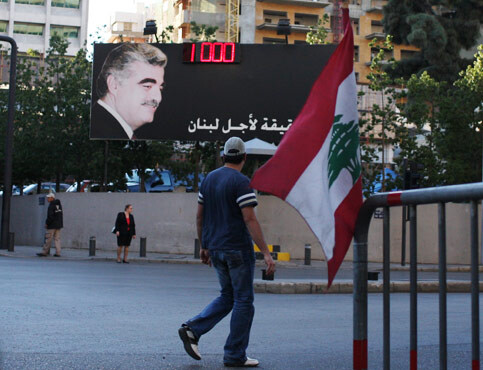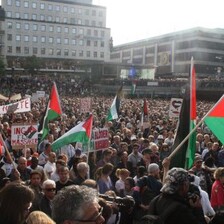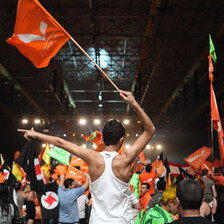Electronic Lebanon 3 May 2009

In November 2007 one of the many clocks around Beirut counted 1,000 days since the murder of Rafiq Hariri and 22 others. (Matthew Cassel)
On 1 March 2008, the Special Tribunal for Lebanon came into effect pursuant to the request of the Lebanese government and United Nations Security Council resolutions 1644 and 1757. The trial is intended to bring to justice to those who carried out the assassination of former Prime Minister of Lebanon Rafiq Hariri and 22 others.
Throughout his time in government, Hariri enjoyed close ties to western governments and figures, the most notable of which being the former French President Jacques Chirac who now occupies an apartment on the Seine formerly owned by one of Hariri’s sons. In addition to courting western governments, Hariri was also saddled with the task of weighing the interests of regional powerhouses like Syria — who many inside of Lebanon blame for Hariri’s killing — and those of his western allies. Ultimately it was a balancing act that proved to be too daunting for the late PM.
Lebanon itself is no stranger to violence or political assassinations. Two presidents and three prime ministers in total have been assassinated since Lebanon’s independence from France in 1944. To boot, during its 15 year civil war (1975-1990) thousands of civilians were murdered and tortured by many of the same individuals that currently occupy some of the highest posts in government and control the country’s political arena. The country’s civil war finally came to an end upon the signing of the Taif Accord engineered in large part by the late Rafiq Hariri himself.
Given this small Levantine republic’s violent past, the explosion that ripped through the heart of Beirut on 14 February 2005 that claimed Hariri’s life may not seem worthy of a tribunal with an “international character” or the invocation of Chapter VII of the UN Charter. Chapter VII authorizes the use of force “by air, sea, or land forces as may be necessary to maintain or restore international peace and security” including “demonstrations, blockade and other operations by air, sea, or land forces of Members of the United Nations” and is usually reserved for events that threaten global stability such as the Korean War and the 1948 call for a ceasefire in Palestine.
Under such circumstances one would think that the inauguration of the court would have been welcomed with the usual fanfare that typifies political events in Lebanon.
However, on a fateful morning in March of this year, Beirut’s residents awoke to a day just like any other.
Apart from a few news blurbs and newspaper headlines, there was little feeling that justice had been duly been served. The only marked difference on that windy March morning was the discontinuation of a long-running series of digital clocks positioned around Beirut marking the days that had passed since Hariri’s death. The clocks adorning the facades of the late Rafiq Hariri’s many commercial and real estate possessions are accompanied by slogans that boldly and simply exclaim the need for “the truth for Lebanon’s sake.” The clocks are strategically positioned around Beirut in places such as Hariri’s own piece of Lebanon’s sectarian media landscape (each confessional group in Lebanon has a TV station dedicated to its cause) and even on the graveyard built to house the victims of the bombing in the center of downtown Beirut.
The cessation of these clocks signifies more than just a passing occurrence in the tumultuous history of Lebanon. For months, these clocks were a reminder to every citizen of Lebanon that their grievances have not yet been addressed. For 1,476 days (to be exact) someone wanted the Lebanese to believe that this time it would be different. That somehow Lebanon — a country with no constitutional court, and a legislative branch so close to the executive they might as well be the same body — could possibly achieve something as fleeting as justice.
The slogans proclaiming the need for “the truth for Lebanon’s sake,” still stand next to the fizzled-out timepieces and the world’s interest in supporting the raison d’etre for the tribunal seems to have abated all the same.
To understand why these events have taken place requires a memory that spans longer than the 100-odd days Barak Obama has been president of the United States. Finger-pointing in the Middle East was a simple and logical political task at the time Hariri was murdered. His stature with the West made it easy to blame (rightly or wrongly) Lebanon’s pro-Syrian security officials for his killing.
In August of 2005, four of Lebanon’s top security officials were detained and held without charges of any kind brought against them. The decision to arrest them came in the midst of the Bush era, a time when, as former Secretary of State Condoleezza Rice once said, the region was still suffering from its “birth pangs.” That same month, John Bolton was appointed as US ambassador to the United Nations. John Bolton later added Syria to the infamous Axis of Evil list because of the country’s possession of the still chimerical “weapons of mass destruction.”
Again, none of this seemed surprising at the time. The western world, and especially the US, was on a voluntary collision course with the Iranian Republic over its alleged nuclear weapons program. Syria was (and still is) Iran’s main ally in the region and the Lebanese were all too ready to prostrate themselves to an imposed idea of justice. The UN and the powers that control it were so intent on seeing the tribunal come to fruition that they subverted the Lebanese parliament — which was in a state of stalemate due to the petty political squabbling of Lebanon’s leading factions — to acquire the legal footing to go ahead with the tribunal. The UN even sat by and watched while the accused sat in jail without being charged for more than three and a half years.
Many things have changed since then. The US, Iran and Syria are now flirting with the idea of rapprochement, albeit for their own regional interests. The Syrian President Bashar al-Assad has since broken out of isolation to the point where Jimmy Carter “wouldn’t be surprised” if the US and Syria restored full diplomatic ties by the end of this year.
On 27 April 2009 the special tribunal made its first decision but did not inform the press. Two days later the court ordered the Lebanese authorities to “release with immediate effect” the four security officials held since August 2005 because they cannot be “considered suspects or accused persons.” The move is seen by many to be a victory for Lebanon’s opposition coalition headed up by Hizballah.
The only “truth” in this anomalous turn of events seems to be Lebanon’s unabated eagerness to embrace the interests of other nations. First, it was the Hariri-led anti-Syrian parliamentary majority who heralded the tribunal as proof of Syrian involvement and brutality in Lebanon (which was evident during its nearly 30-year-long occupation of the country). Today, the Hizballah-led pro-Syrian opposition is pointing to the verdict as a victory for “justice.” The opposition has long claimed that the tribunal lacked credibility due to its politicization.
Indeed, when one looks at which nations actually bank-rolled the whole affair, which was expected to cost over $190 million and last more than three years according to Robin Vincent, the former registrar (another name for chief administrative officer) of the special tribunal, it is little wonder who is putting their money where the interest is. To date, most western countries and a collection of “regional states” who have “exercised their right to remain anonymous,” says Vincent, have put forward over $65 million already.
Vincent resigned less than three weeks ago (16 April). When I spoke to him in March he was glad to inform me that the holding cells for the four accused in the Dutch seaside resort of Scheveningen were all too ready to accept them. He did however seem rather annoyed that the request to transfer the accused had yet to be made. Now I realize that Vincent’s resignation was linked to the latest decision to release the security officials. After all, who would want to run a tribunal with no one to try?
Sometime between March and 27 April it seems that the decision was made to let Syria off the hook, whether they committed the act or not. This has left the door open to a multitude of potential targets. Who will now be blamed for the killing will depend on when global powers can come to a decision on who their “terrorist of the day” is.
In the meantime, the Lebanese have proven that they are still not ready to make their own decisions about the future of their nation. In approximately one month, Lebanon will go to the polls to vote for its next parliament and it is expected to be a close affair. Whoever wins will bear little consequence on the ground since both sides of the political spectrum are neither free nor independent of their external backers. The best case scenario seems to be a hung parliament; the worst case scenario is another war.
More than 15 years have passed since its civil war and Lebanon still does not have a nation to speak of. Its institutions are corrupt black holes of bureaucracy. Its people, divided by the aspirations of others, still lack a sense of common purpose. Their political discourse remains one of sectarian rivalry instead of public interest. Their impetus for voting remains the prevention of “the others” from taking power. And, if the recent events are anything to go by, their notion of justice will remain as empty as it ever was.
Editor’s note: This article originally reported that the special tribunal decided to release the four security officials on 20 April. The article has been updated to reflect the correct chronology.
Sami Halabi is a freelance journalist and political commentator based in Beirut who covers a variety of economic and political issues relating to the Middle East and in particular the Israeli-Palestinian conflict.





